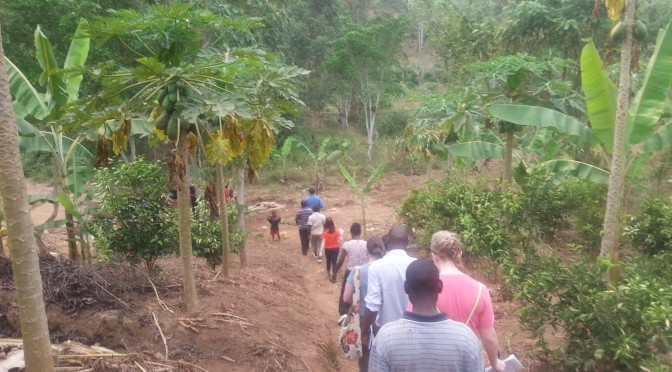Saturday – Arrival in Kampala
Around 11 pm, we arrived in Entebbe and greeted our guides Moses and Martin who drove us from the airport to Kampala, the capital. I think I can speak for most of us when I say that I was shocked with the Ugandan highway system consisting of no traffic lights, no stop signs, no crosswalks and plenty of chaos. After an hour drive depicting some of the Kampalan nightlife, we made it safely to the luxurious Golf Course Hotel (the nicest place I’ve ever stayed at), eagerly awaiting the next day.
Sunday – Kampala to Masaka to Peter’s Farm
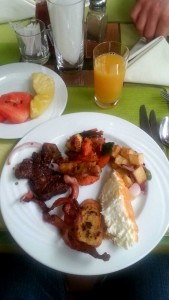
Over the course of the past few weeks, our TA’s and Professors have been warning us about the quality of food we’d see in Uganda. Overall, they described it as repetitive, bland and not filling. Well if Sunday breakfast was supposed to prepare me for the rest of the trip…it didn’t. Fresh cut pineapple and veggies, bacon, steak, eggs, potatoes, toast, passion fruit juice and coffee welcomed all of us in the morning. It set us off on the right foot, but potentially set us up for a huge letdown later on.
We left Kampala around 9 am for Masaka, a town near Peter’s farm. The drive was incredibly beautiful to say the least. Even on a Sunday morning, the streets were packed and the country was bustling. Everyone was out and about, cows were walking down the median, children were running around and businesses were open and active.
Our first pitstop came at the equator. The whole group took plenty of pictures. I took plenty of pictures with my selfie stick and others took plenty of pictures of me taking pictures with my selfie stick. I’m pretty sure no one has looked like more of a tourist than I did during our time at the equator.
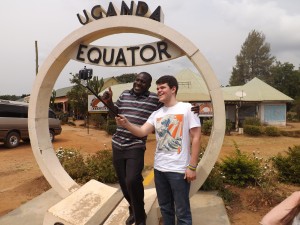
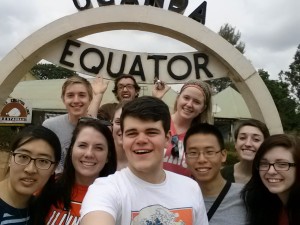
Our second pitstop was for lunch in Masaka Town. We ate at an awesome buffet diner that served a variety of food including Matoke (a roasted banana dish), chicken, beef, potatoes and a peanut sauce that everyone enjoyed. During lunch, some of us made an attempt at learning a few sayings in the local language including “Thank You”, “Good Bye”, “Good Morning Sir” and “Good Morning M’am”. Looking back, I’m fairly sure I spent half of the night saying “Good morning m’am” in place of “thank you”, so hopefully one of the later blogs can track my progress in the language department.
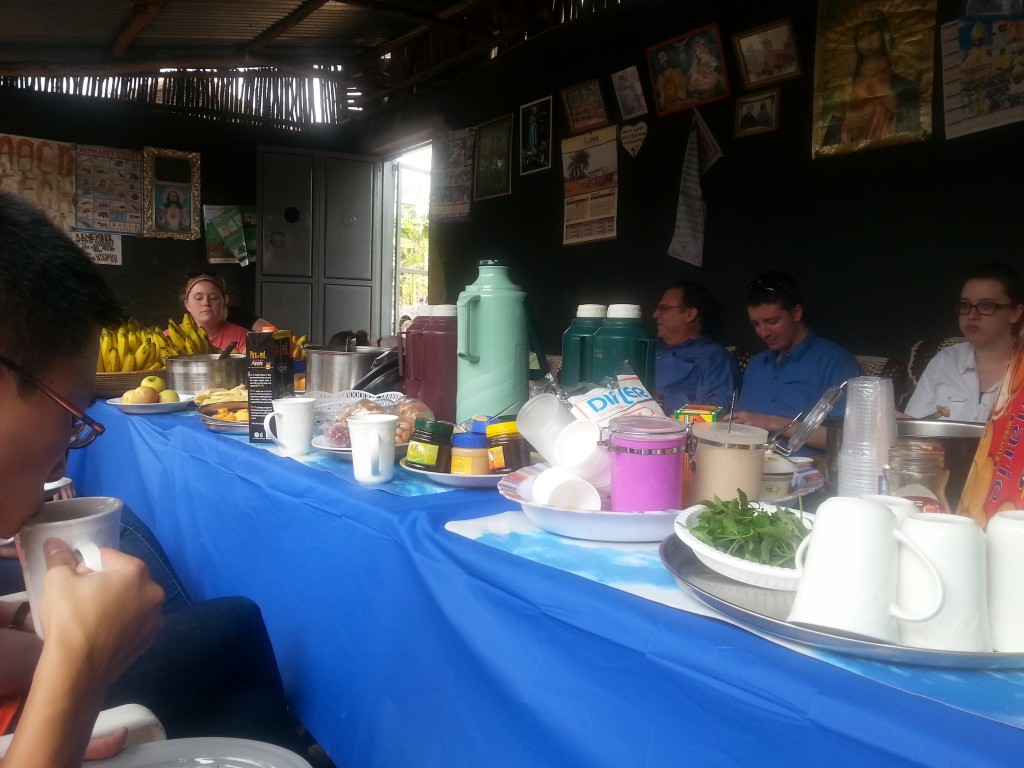
Finally around 3 pm we arrived at Peter’s farm. Our house for the night was appeared small but contained a seemingly endless number of rooms, each with a few beds and our first mosquito nets of the trip. Peter gave us a brief tour of the home, instructing us on how to enter the house (without our shoes), how to go to the bathroom (the latrine off of the kitchen), how to wash our hands (with a small amount of pre-boiled water) and how to take a shower (with a cup and bucket). Before heading out to tour his farm, we enjoyed a “snack” and by “snack” I mean “feast”. We splurged on fresh pineapples, jackfruit, mangoes, peanut butter, chips, pork, and fried cassava (a root vegetable tasting similar to french fries).
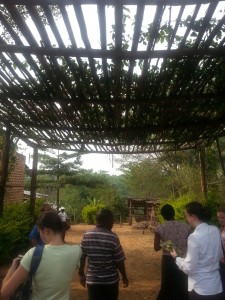
The farm was unbelievable. Used as a model for sustainable farming in an attempt to combat climate change, everything worked in unison and for a purpose. Nothing was wasted. The soil consisted of nutrients from homemade fertilizer and previous plants. Cassava trees frequented the premises whose leaves were eaten by the animals and roots harvested for the people. Pigs and chickens were used for both food, eggs and ranching, with their waste fueling a biogas reactor. On top of all this, the farm has a corn mill, farming training center, multiple well cites, bee farm and grows bananas, plantains and java.
(An aside about Peter. Peter Luswata is a local entrepreneur doing incredible things for all of Uganda. His training center and model farm have helped thousands of local farmers improve yield and learn innovative, proven sustainable farming activities. The work that he does is incredible and under appreciated. I’ve only spent a day with Peter and I know that the world needs more Peters, many more Peters.)
As part of the sanitation team, Kate, David, Lauren and I focused our efforts on Peter’s digester. The underground digester allows the pig waste to break down and produce biogas which is piped up to a gas stove and light. While the digester isn’t nearly as fancy or efficient as the ones in the US, it provides enough energy that could cook meals for a family of five, according to Peter. Peter’s farm has spearheaded the anaerobic digester movement in Eastern Africa and with the help of NGOs and groups like the University of Illinois, he has hopes of it spreading and benefitting farmers throughout the area.
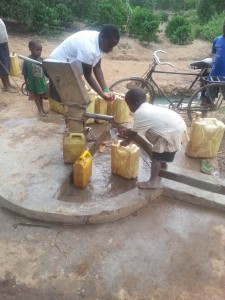
After inquiring about the digester, we took a number of water samples at the local wells. Dozens of children watched as we ran our probes testing for various contaminants. It was truly a cool moment having the local community watch us do our tests in wonder and awe. After witnessing the wells and jerry cans in person, I more than ever want our research to lead to a safer and cleaner drinking water source for these people.
We capped our night with a nice dinner at the house, with items similar to those had earlier in the day (pineapple, potatoes, cassava, pork, matoke and that great peanut sauce). Peter also came around with some fried fish that we had purchased on the road earlier in the day. Before heading to bed, we had a brief group discussion on project options and our plan moving forward when we head to the refugee camp.
Monday – Masaka to Mbarara
Even though Benito let us “sleep in” until 8:30, most of us were up at the crack of dawn due to the local roosters (it produced more of a pig snort sound than a cockadoodledoo). Breakfast once again was extravagant (I don’t think I’ve eaten more fruit ever in my life), however I was unfortunately defeated by a mango (my peeling, slicing and eating produced more mess than actual food). Most of our morning time was spent playing with Prisca, the incredibly cute 2 year old daughter of the homeowners. She was amazed by Lauren’s camera and couldn’t seem to comprehend the video on my phone. I would’ve posted the entire 2 minute video that she took of herself, but the WiFi is limiting (To quote Peter: “How is the WiFi? Not Good? Welcome to Africa”).
We left around ten to Mbarara, a larger Ugandan city about 3 hours from Masaka. The drive was peaceful and scenic, we spotted 3 zebras, 6 impala and 23,189 cows. This part of the country is known for its ranching, opposite of the farming communities we frequented on Sunday.
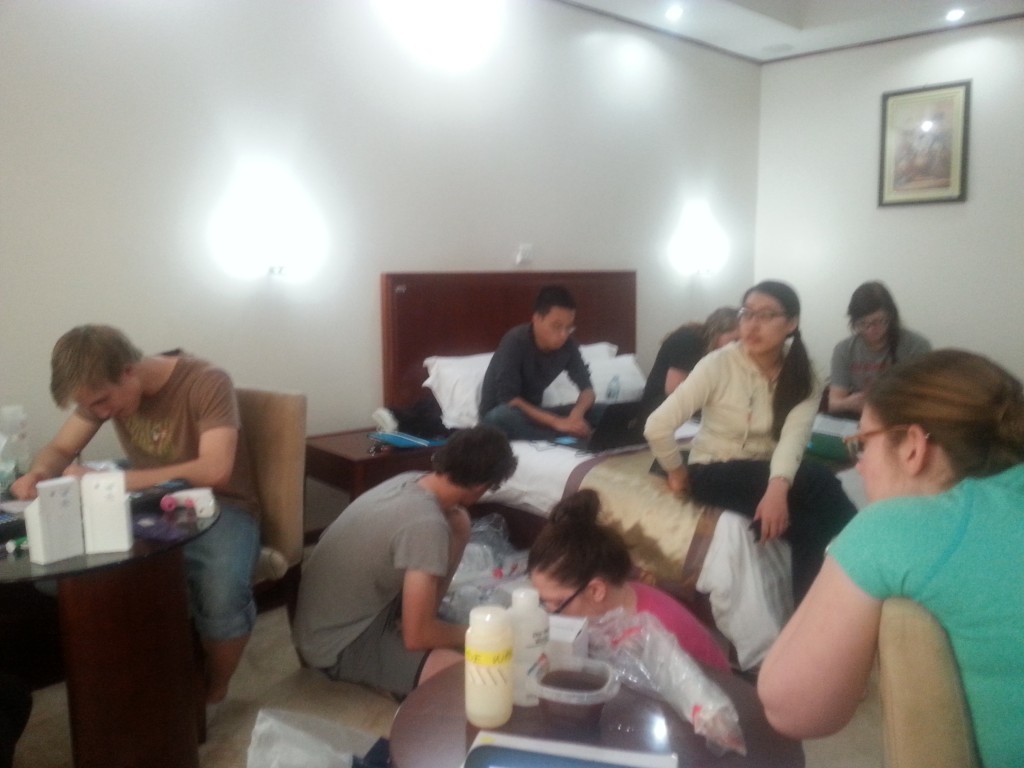
I close my blog with us posted up at the Lake View Hotel in Mbarara. Our team is hard at work calibrating equipment for the next few days at the Oruchinga refugee camp. So far the experience has been incredible and I only expect it to get better, even if the workload ramps up a bit. As someone who has rarely been out of the country, my two days in Uganda have been eye-opening. From using a latrine for the first time to seeing the extreme poverty and low water quality, I’ve not only never been more grateful for everything in my life, but I’ve never been more driven on improving the situation in East Africa. CEE 449 has given us an incredible opportunity and once again I think I speak for all of us when saying that I don’t want to mess it up.

